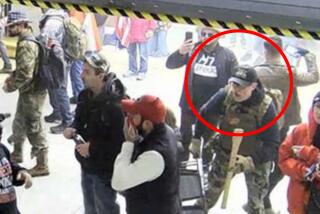U.S. soldier pleads guilty to murder of three Afghans
A young Army infantryman from Alaska pleaded guilty to the random murders of three unarmed Afghan civilians and was sentenced to 24 years in prison Wednesday.
Military prosecutors called the incidents “acts of unspeakable cruelty.” The defense blamed a dysfunctional Army brigade with a renegade commander.
Under the plea bargain, Spc. Jeremy Morlock pleaded guilty to murder and to one count each of conspiracy, obstructing justice and illegal drug use. He stands to become the most important witness in a series of prosecutions against other members of the unit, including Staff Sgt. Calvin Gibbs, the squad leader and purported ringleader. Fellow soldiers say Gibbs bullied them into cooperating in the grisly plan.
In an extraordinary court-martial hearing at Joint Base Lewis-McChord, south of Tacoma, Wash., Morlock admitted devising “scenarios” under which U.S. soldiers snatched civilians from Afghan villages and quickly killed them with rifles and grenades, sometimes taking fingers as souvenirs. The soldiers later staged the slaying scenes with prop weapons to make it look as if the victims had died in a firefight.
“We don’t do this. This is not how we’re trained. This is not the Army,” military prosecutor Capt. Andre O. Leblanc told the court. “Instead of providing these people with the security they needed, instead of building relationships of trust, instead of doing the job we expect of our professional soldiers, the accused and co-accused decided to engage in acts of unspeakable cruelty.”
But Morlock’s lawyer presented evidence that the 23-year-old infantryman and other soldiers in his troubled platoon served under a former Stryker brigade commander, Col. Harry D. Tunnell IV, who flouted the Army leadership’s conciliatory policy in Afghanistan and drove his soldiers to go violently after the enemy.
“The words that I saw used were ‘search and destroy.’ … Several other [members of the brigade] mentioned the fact that you were good in Col. Tunnell’s eyes if you were aggressive and the body count was high,” said Stjepan Mestrovic, a sociologist and war crimes expert who testified for the defense.
Mestrovic interviewed commanders and reviewed hundreds of pages of sworn testimony that he said depicted a dysfunctional brigade seen as a “lone duck” among other Army units in Afghanistan.
Morlock’s conviction is the first among 12 soldiers charged in a case that has drawn international attention, especially since the German news magazine Der Spiegel published photos Sunday showing soldiers from the unit posing with Afghan corpses. One showed a smiling Morlock holding up the head of a dead Afghan villager by the hair.
Three other men from Bravo Company, 2nd Battalion, 1st Infantry Regiment stand accused of murder, including Spc. Adam Winfield, who told his father what was happening and said he had been threatened. Winfield’s father alerted authorities, but nothing was done for months. Also charged in the slayings are Pfc. Andrew Holmes and Spc. Michael Wagnon.
Seven others are accused of lesser crimes, including drug use and participation in the beating of an unpopular private to discourage him from alerting commanders to soldiers’ rampant hashish use.
Prosecutors initially sought a sentence of life without parole for Morlock. But under the plea agreement, he will become eligible for parole in seven years, with credit for time served, said his lawyer, Frank Spinner.
Morlock apologized to the families of the victims, his fellow soldiers and “the people of Afghanistan.”
“I’ve had a lot of time to reflect on my actions in Afghanistan and attempt to explain … how I lost my moral compass,” he told the court. “I don’t know if I’ll ever be able to answer those questions.”
The courtroom was packed with family and friends of Morlock from Wasilla, Alaska, where he had led the high school hockey team to the state championship.
They testified that Morlock was a bright and popular young man who grew up playing G.I. Joe games and idolizing his father, a Vietnam veteran who remained in the Army National Guard and worked in the oil fields of the North Slope.
“That was his goal all his life — to be an Army guy like his dad,” said his mother, Audrey Morlock. But her husband died in a boating accident in 2007 about a year after Morlock enlisted in the Army, she said, leaving her son rudderless.
“If he had been alive when I was in Afghanistan, I know it would have made a difference,” Morlock said. “I realize now I wasn’t fully prepared for the reality of war as it was being fought.”
His mother’s testimony was fractured by sobs. “We know he went to war for a reason,” she said. “We don’t know what happened.”
The plea documents that lay out Morlock’s crimes say the killing “scenarios” were Gibbs’ idea and that he said it was best to enact them in areas of heavy Taliban presence when no one else was around. According to testimony, Gibbs said he had done the same thing in Iraq.
On three occasions beginning in 2009, in villages around Forward Operating Base Ramrod in the southern province of Kandahar, Gibbs, Morlock and the other three soldiers named in the murder charges are said to have lured unsuspecting villagers away from others and killed them, planting weapons nearby afterward and calling for help.
“You’d select a target, you’d kill them, and then you’d use a ‘drop’ weapon to establish later that, ‘They had a weapon, and that’s why I killed them,’ ” said the judge, Lt. Col. Kwasi Hawks.
“Yes, sir,” Morlock replied.
“Were you going to shoot at people to scare them, and it got out of hand, or was the plan to kill people?” Hawks asked.
“The plan was to kill people,” Morlock said.
More to Read
Start your day right
Sign up for Essential California for news, features and recommendations from the L.A. Times and beyond in your inbox six days a week.
You may occasionally receive promotional content from the Los Angeles Times.






